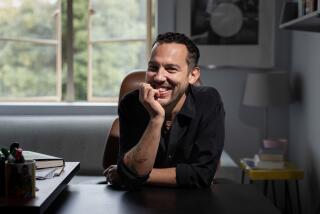BOOK REVIEW / FICTION : Of Neurotics and Academic Hangers-On : THE MAN OF THE HOUSE, by Stephen McCauley (Simon & Schuster; $22, 287 pages)
- Share via
In Stephen McCauley’s third novel, Cambridge, Mass.--home of “Harvard World” and its academic hangers-on--is a sort of Sargasso Sea where careers float becalmed and relationships are snarled in complications fathoms deep.
Everyone in “The Man of the House” is waiting for a breeze to fill their sails and unjam their rudders, but in the meantime, years--even decades--drift by.
McCauley (“The Object of My Affections,” “The Easy Way Out”) does some nice things with the comedy such a subject affords. He writes unsentimentally, if warmly, about sentimental people. He makes gay life seem no more or less exotic than straight life. He manages to poke fun at his characters’ foibles while getting us to view their problems almost as seriously as they do.
Even the dog in this story is neurotic, but we want to pet him just the same.
Clyde Carmichael, the narrator, is a gay man pining after his ex-lover, Gordon, who has left him long ago for somebody upscale. Clyde, 35, lives in a “dump” of an apartment house and teaches at a second-rate adult school where his students chatter about food, their love lives--anything except what’s on the reading list.
Clyde’s current roommate, Marcus, handsome but unswervingly straight, has been working on his dissertation for 10 years, with no beginning in sight. A “professional innocent bystander,” Marcus is forever seducing young women who soon leave him, disillusioned by his inertia.
Clyde’s divorced, pitiably insecure sister, Agnes, lives just over the New Hampshire border with her punked-out 14-year-old daughter, Barbara. In Agnes’ basement lives the source of many of her and Clyde’s woes--their father, a world-class grouch.
Clyde and Agnes have been waiting all their lives to resolve “unfinished business” with their father, to win some sign of his approval, while the old man, a blatant homophobe, dangles before them the promise of money he may have made from the insurance on stores he had torched, and bullies them with claims that he’s terminally ill.
Clyde’s best pal, Vance, has pined for his ex-lover, Carl, longer than Clyde has for Gordon. He regularly takes Carl’s mother out to dinner and insists on eating where Carl used to work.
Donald, the straight man who lives in the apartment below Clyde’s, has pink hair, a dubious job and an aura of futility.
Louise Morris promises to be the wind that might set their canvas to flapping at last. An old friend of Clyde’s, an ex-lover of Marcus’, she is a successful novelist who has accepted a grant to work in Cambridge, bringing along the 12-year-old son, Ben, she has raised alone during a life of notable independence.
And Louise does stir things up, but not as expected. She, too, proves to have unfinished business--she has failed to tell either of the interested parties that Marcus is Ben’s father.
“The Man of the House” is a novel about growing up--about how it can come too late for some people, and other people can be too late for it. At best, it means the end of funkiness and careless rapture.
McCauley brings to this bittersweet theme a manic wit, a gift for writing about children--Ben and Barbara both ring true--and an endearing weakness for epigrams: “Show me a man who sleeps on his sofa, and I’ll show you a man willing to keep an open mind about the possibility of life on other planets.”
His other secret is best expressed by Clyde in talking about Vance, who verges on caricature. Vance has “boundless neurotic energy,” Clyde admits, but “above all else, he was a kind man and, like all kind people, pleasant to be with and mildly depressed.”
McCauley, too, is a kind man--pleasant to read, even when the conclusions he reaches in his story are sometimes cruel.
More to Read
Sign up for our Book Club newsletter
Get the latest news, events and more from the Los Angeles Times Book Club, and help us get L.A. reading and talking.
You may occasionally receive promotional content from the Los Angeles Times.









